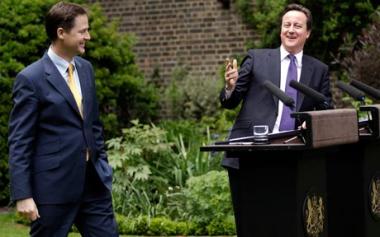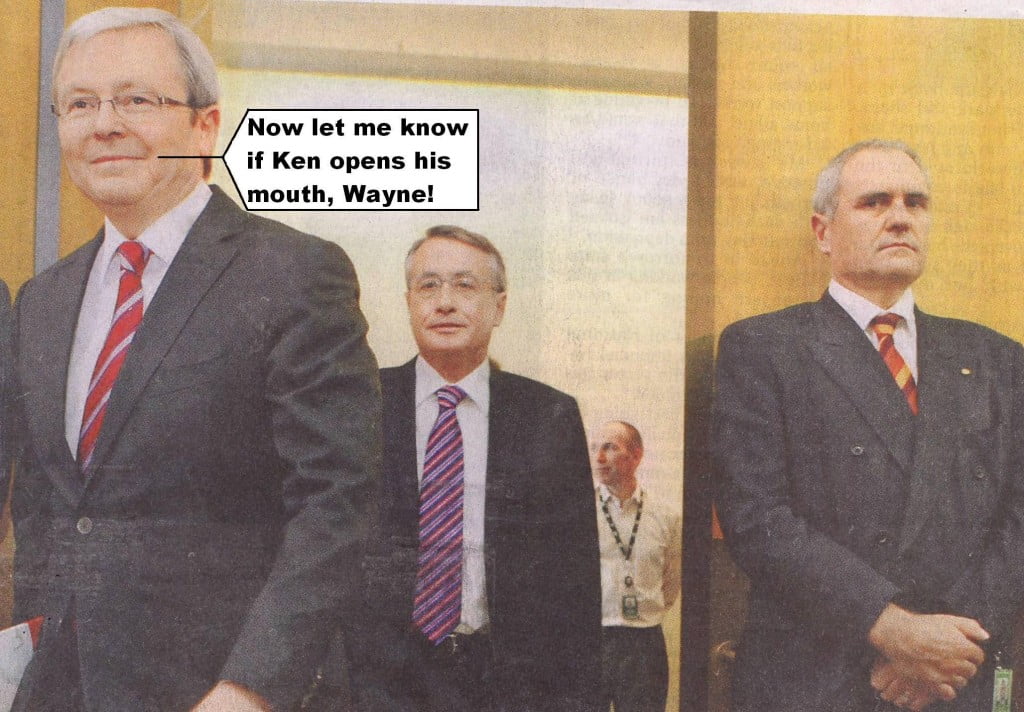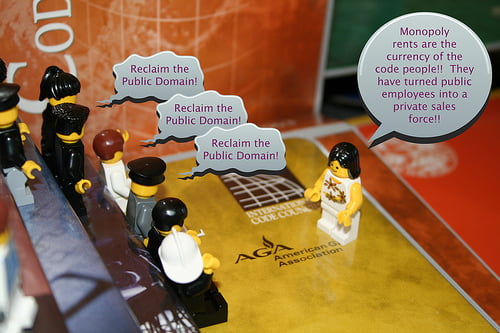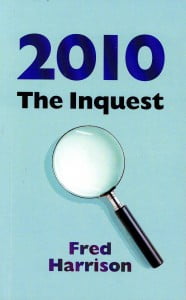
Whaaa…? Me…? Do Damage?



BRITISH BONHOMIE
Well, there was David Cameron transitioning into number 10 without so much as a suitcase in sight.
And wasn’t the new found camaraderie between him and Nick Clegg pleasantly agreeable to behold? You’ve got to wish them both ‘good luck’ in dealing with the UK’s horrible financial plight which almost went missing during the election campaign.
No, you’ve got to wish them more than luck. You’ve got to wish they discover the fantastic potential of public rent-capture, if the UK is ever to resolve its dire economic situation satisfactorily.
If the Cameron-Clegg team doesn’t discover rent it, too, will be thrown upon the scrap heap of history to which the UK public has consigned a miserable Gordon Brown.
Brown was gracious, almost statesmanlike, during the handover but, regardless of his claim to being one of Britain’s great Chancellors of the Exchequer, Gordon Brown amounted to a political failure, a mere snake oil salesman for 20th century junk economics, a period in world economies that US professor of economics Michael Hudson has described as “The Counter-Enlightenment.”
“Counter Enlightenment”: that is indeed descriptive of the economics that has been permitted to seize us by our ‘user pays’ (never ‘beneficiary pays’) throats because, where classical economic reform had advocated taxing away land rent, ‘modern’ neo-liberal economics has promoted its privatisation through rent-seeking in real estate and mineral resources, converting freeways into tollways (and similarly privatising other natural monopolies), and numerous forms of price-gouging – with the results we now see all about us. It’s not coincidental. It’s been a devastating period of false, non-scientific economics. And that’s the way economics is being taught in our universities, folks!
We’ve allowed the rent the community creates – and which represents the community – to be stolen by carpet-baggers. As a result, a sense of community has disappeared at the same time rent-seeking by greedy ‘investors’ has replaced productivity and real wealth creation.
HALLELUJA!
The new Conservative/Lib-Dem coalition could take a lead from Australia.
It wasn’t until I took a few days off interstate with my wife, that the enormity of some of Ken Henry’s recommendations for “Australia’s Future Tax System” really sank home. Whilst away, I was able to see them in a broader perspective.
Henry’s panel actually came out in favour of slashing taxes and capturing Australia’s economic rents!
I wondered to what extent the efforts of Michael Hudson, my colleagues or I may have influenced the panel’s decision, or had they arrived at their conclusions quite independently? I guess we’ll never know. It doesn’t really matter.
What does matter is that Australia has taken the first hesitant steps in becoming the hub of a counter revolution in economics – and the Henry Review should be heartily congratulated for the part it has played in that process.
Now to convince timorous politicians, whether in Australia, the UK, or elsewhere, to play their historical part in this counter revolution.
It would be nice to see messrs Rudd, Cameron, Clegg and Obama leave office having solved their economic conundrums in the tradition of David Ricardo, Adam Smith, John Stuart Mill and Henry George, instead of departing the political scene defeated, still clinging tenaciously to the dismal ‘supply and demand’ economics that served Margaret Thatcher, Ronald Reagan and Gordon Brown so poorly.

SO, A PETROL BOMB WILL FIX THINGS?
What sort of mentality is it that brings a petrol bomb along to a protest rally at an Athens bank? One that doesn’t so much as flinch at the three tragic deaths it caused?
Clearly, emotions in Greece are beyond raw, but all of us outside Greece know what must be done. The Greeks have got to buckle down and honour the additional loans they’ve been given by the IMF and their European brothers.
That might mean extending retirement age from 53, cutting salaries and working much harder for decades to get the country’s head back above water. No doubt the Greek Right also think this way. The Left disagrees. It thinks there’s got to be another way out – but its fringe throws petrol bombs.
It’s easy to regard the Greeks as wanton miscreants, living on the slate as if there’s no tomorrow. We conclude that they’re simply paying the penalty for having lived high on the hog. We’ve been more circumspect than Greece. Have we? Have we really?
Is there another analysis of the Greek crisis?
I see a striking similarity between those who took out subprime loans in the USA and events in Greece. Both were living on the edge. Both were simply the outliers, the harbingers of something that was to be visited upon them by a system that had been allowed to run rampant.
Neither those who took out subprime loans in the US, nor Greeks who chose an unsustainable lifestyle, ever had a snowflakes chance in hell of making good their escape from indebtedness to the banking system. They seem to have an inkling that a rotten tax regime is behind their deep travail, but have little or no understanding of economic rent.
Greeks protesters chose their targets well: parliament, the tax office, and banks.
Do I hear you exclaim: “Bullfeathers! They ARE just wanton miscreants?”
What if they reflect OUR future? Could Greece be the canary in the mine – as were subprime loans to the Americans?
I’m always skeptical when the doctor, the IMF, is called in. The Greeks can’t pay their debt, so give them more. I think I can understand why Angela Merkel is worried about whether she’s ever going to see Germany’s loan repaid. Maybe in her heart of hearts she realises German banks also funded the party in Greece, and ….. oh well, now she’s got to keep playing the game and supporting the Euro?
Greece has reached its anger phase. We remain in denial.
Acceptance will come to us both …. but not today.




A GOOD REPORT
[PITY ABOUT THE GOVERNMENT BACKSLIDING ON IT]
Happily, I was wrong. The recommendation for a more comprehensive land tax to replace the ragged array of state land taxes does remain intact. It’s well and truly visible in the picture “Australia’s Future Tax System” painted by Ken Henry today. But the Rudd government rejected it.
The AFTS report is very good. The panel deserves congratulations for a more rigorous effort than usually passes for tax reform in Australia.
[However, someone connected with producing the land tax aspect of AFTS didn’t see that high land prices simply reflect the private capitalization of land rent which remains uncollected by government. He or she has taken on board the real estate industry’s furphy that it has something to do with the supply and demand of land. Issues of supply and demand count for nothing in a tax-induced real estate bubble.]
And, hey, the government has accepted the recommendation for a resource rent tax of 40%! Excellent stuff! But there the good news ends. The rest was all an election year cop-out by an increasingly timorous Rudd government. Realpolitik rules! Efficacy? Leadership? What’s that?
I couldn’t express it any better than Alan Kohler does in his excellent Business Spectator article here.
In summary, the numbers are as follows:-
Henry Review recommendations: 138
Recommendations accepted: 1.75
Recommendations rejected or deferred: 136.25
Let’s hope whoever wins government later this year has the intestinal fortitude to do what’s right, to complement the resource rental tax with the proposed comprehensive tax on land values. As Ken Henry’s report shows, it provides scope to abolish a number of atrocious state taxes.
And, as my submission to AFTS showed, such a comprehensive tax on land values is an essential ingredient in staving off some of the devastation that’s going to occur when our real estate bubble bursts shortly.

 TOMORROW (SUNDAY): THE BIG DAY!
TOMORROW (SUNDAY): THE BIG DAY!
The government releases the Henry review panel’s recommendations for “Australia’s Future Tax System” tomorrow.
This is THE great opportunity to minimize the damage that’s going to occur when the Australia’s real estate bubble bursts and our banks are left exposed like shags on a rock shortly.
To what extent will the government slash taxation and capture our publicly-generated land and resource rents? Will the Rudd federal government seize the opportunity, or will Kevin Rudd backslide again?
NEGATIVE GEARING
Leaks suggest the Henry review panel has recommended that ‘negative gearing’ be abolished. That’s good, because that’s where some taxpayers have historically been roped into helping finance other taxpayers real estate ‘investments’. [!] As negative gearing has also acted to escalate the prices of homes, but not necessarily their real values, it will be a boon to first homebuyers should the hearsay prove accurate.
RESOURCE RENT TAX
It’s also said that a federal resource rent tax has been recommended for mineral extraction. Such a ‘super profits’ tax, i.e. resource rent, might be resisted by the mining industry but if it is, our miners can expect a hard time from Australians increasingly cognisant of the fact that we’ve been short-changed, done in the eye, for far too long: we need a fairer share of resource rents to find its way back at long last into Australia’s coffers.
When a business run as a ‘going concern’ is leased to a tenant (i.e. both the freehold and the business), it is not uncommon for net profit before income tax and depreciation to be split approximately 50/50 as between the landlord and the tenant as rent and profit, respectively. It is beyond time that a similar arrangement came into existence for mining, because existing state mineral royalties are risible: ten cents a tonne to the government insults Australians to whom the natural resources belong. Miners need to recognise this partnership with the Australian people.
Company tax on mining companies would need to be abolished, of course, and the sum of state royalties and the federal resource rent should not exceed 50% of the adjusted net profit, or the mining companies WOULD then have something about which to complain.
A FEDERAL LAND TAX?
Ken Henry’s recommendations went forward to the Rudd government in December 2009, reportedly with a recommendation for a federal land tax.
Even the Property Council of Australia (PCA) has come out in support of a federal land tax which would reform state land taxes, with their dog’s breakfast of exemptions, thresholds, multiple rates and aggregation provisions, etc. Maybe the Land Values Research Group’s website introductory page influenced the PCA? It shows that EVERYBODY benefits from public capture of land rent and concomitantly reduced taxes.
But has the recommendation for a federal land tax gone missing, because it has been reported that Prime Minister Rudd and Treasurer Swan actually required Ken Henry to review some of his own panel’s recommendations.[!]
Er, with a view of removing what, exactly, Kevin and Wayne …?
We’ll all know tomorrow!

ANZAC is the acronym for the Australian and New Zealand Army Corps. Today is the day Australians and New Zealanders pause to honour their countrymen who went to war: those who died tragically, and those who did not, but returned carrying the physical and psychological scars.
Anzac day now remembers men and women who served Australia and New Zealand in all theatres of war since World War I, but the original Anzacs were those who fought and were defeated by the Turks at Gallipoli in 1915.
Winston Churchill was the UK’s Liberal Party’s minister for the navy during WWI. He had fallen out with Admiral Sir “Jackie” Fisher, believing he could force a passage through the Dardanelles without the assistance of the army. He was proven disastrously wrong.
Although they had worked well together in preparing a powerful naval force, Churchill and Fisher had something of ‘a history’ going back to 1910. Here’s the background:-
As a member of the aristocracy himself, Churchill had seen that the powers that be in England and Germany were both spoiling for war on various imperial fronts.
Together with Liberal Prime Minister, Herbert Asquith, and Chancellor of the Exchequer, David Lloyd George, Churchill believed that war would be averted if Britain could put people into employment and re-establish its former industrial supremacy over Germany. Accordingly, the 1910 People’s Budget would assist this aim whilst making the rich contribute their fair share to the public coffers. The government was to introduce a land tax.
It never happened.
Whilst announcement of a tax on land values was greeted with joy by Britain’s workers, it was greeted with alarm by the upper class. It had to be defeated at any cost, but how to do so when this government was so popular?
Why, call the Liberals’ patriotism into question, of course!
Under Jackie Fisher, the Admiralty had sought six new Dreadnought battleships. When Treasury under Lloyd George elected to provide only four, an insistent and increasingly more popular chant went up: “We want eight and we won’t wait!”, to which the government was eventually forced to accede. War was thus ensured.
Churchill knew well of Jackie Fisher’s surreptitious involvement in the plot devised by the conservatives and the aristocracy. Fisher no doubt justified himself by believing he was looking to the best interests of the navy.
Of such matters are wars born. Of such matters were innocent young men consigned to be slaughtered at Anzac Cove in 1915.
Out beyond the deathly machinations of power and privilege, there is beauty and valour to be found amongst lives lived at the margins. Today, Anzac Day celebrates some of these people.

 POLITICIANS, THE ECONOMY, AND OURSELVES: BEYOND HELP?
POLITICIANS, THE ECONOMY, AND OURSELVES: BEYOND HELP?
Barrack Obama’s next major economic initiative is to regulate the errant financial system. Senator Chris Dodd yesterday foreshadowed a Bill that’s going to ensure the US won’t have another GFC.
Fat chance. It will amount to smoke and mirrors, because the internationally accepted rule of the political game is if you want to get re-elected, you must shut up about one big thing: you never challenge those powerful banking parasites and others about their leeching off the public’s land rent.
Back in 1984, Englishman Fred Harrison’s “The Power in the Land” inspired me to collate the total numbers and prices of all of Australia’s real estate sales each year. I figured I’d be able to use Harrison’s economic insights to graph and explain Australia’s real estate bubbles and the resultant economic recessions.
Harrison’s latest book, “2010 The Inquest”, documents how Tony Blair, Gordon Brown, Alistair Darling, Peter Mandelson, and Alistair Campbell chose to ignore his personal warnings in 1997 and subsequently that a UK residential real estate bubble was about to develop. It would burst in 2007, and the economy would bottom out badly in 2010. He’d earlier correctly forecast the 1992 recession.
Peter Mandelson is the grandson of Herbert Morrison who had broken ranks to move an unsuccessful Bill to shift taxes off peoples’ wages and onto the rental value of land in 1939.
Alistair Campbell, Prime Minister Blair’s spin doctor, had earlier worked with Fred Harrison within the Mirror Group of newspapers and on Today. He replied on 5 February 2003 to another of Fred’s approaches: “I’m a little bemused as to why you believe this country’s economic policy is ‘a shambles’.”
Thanks to Harrison, the truth is now out: Britain’s politicians and their advisors considered it better the UK suffer the depredations of an economic depression rather than repair the tax system upon which capitalism is based. Here, surely lies the corruption of all corruptions?
Harrison observes that “politicians will provide leadership only if the terms of public debate shift away from the language of séance to the methods of science.”
Gordon Brown didn’t choose the science. He went for the occult. The part he played both as Chancellor of the Exchequer and Prime Minister, illuminates his duplicitous behaviour.
In his first budget speech on 2 July 1997, Brown unfurled his glorious standard: “I am determined that as a country we never return to the instability, speculation and negative equity that characterised the housing market in the 1980s and 1990s.”
Curiously, Gordon Brown’s 1997 budget speech has gone missing from Treasury’s website. His published budgets now commence with his second (1998) speech! Luckily for posterity, Brown’s words from his first budget remain in Hansard to haunt him.
Nevertheless, when challenged by Andrew Marr [of ‘Britain From Above’ fame] in a BBC TV interview on 21 September 2008 for not delivering on his ‘no more boom and bust’, Gordon Brown resorted to bare-faced denial: “The idea that you’re going to rewrite the last 10 years in that way is completely wrong!”
Instead of heeding Harrison’s intensive studies, Brown deferred to his bureaucratic drones and closest economic advisor, Shriti Vadera, whom he’s since elevated to the House of Lords for her fine work. Brown has somehow managed to resurrect himself as the man who would rescue world economies: they must print money and bail out banks by buying an interest in them.
Harrison’s book will receive publicity in the UK because he’s an incisive and entertaining writer, journalist and economist who has become better known throughout Britain with each release of the many books that followed “The Power in the Land”. In the failing economic climate, he deserves to be introduced to a worldwide audience.
That true economics is indeed a science, not the arcane manifestation which visits recession upon us every 18 years, will surprise the high priests of our failed economics. They, too, ought to beg, borrow or steal a copy of Harrison’s book if they want to understand why “An economy driven by land speculation rests on unreality.”
There will be many, many books written about the GFC. None will be more important, nor clinically surgical about the failure of British politics than “2010 The Inquest”.
LAND, LABOUR & CAPITAL: THERE’S ONLY ONE WE HAVEN’T TRIED
